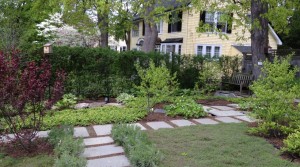An Interview with Andrea Nilsen
of Nilsen Landscape Design
Tell us a little bit about your company and its foundation.
Nilsen Landscape Design is a small design firm based in the Charlestown neighborhood of Boston. I founded the company in 2010 after earning a Certificate of Landscape Design from the Boston Architectural College and leaving a career in the corporate world. The field of landscape design was really a perfect match for me, combining my love of design with the natural world, leveraging the skills I had learned in business around the value of customer service and project management, and acknowledging my natural tendency towards entrepreneurial work. In our fifth year, we now work all over the metro Boston area and into neighboring New England states to create beautiful residential landscapes.
Please explain the concept of sustainable design as it relates to landscape.
Sustainable design is really about creating something that can thrive without additional input over time (that input may be financial, physical, chemical, etc.). When we talk about building sustainability it is often about waste reduction, energy efficiency and water efficiency. On the landscape side, the same concepts come into play. The goal is to limit disturbance of the natural environment, preserve and reuse where possible, design features that require less energy (i.e. maintenance, and chemicals), and of course reduce water demand.
In your opinion, why is it important to reduce water demand within a landscape design?
Landscapes that have a high water demand cost more. The water and energy to irrigate the property is expensive, and there is an environmental cost to using potable water for a purpose other than drinking. There are certainly times during the summer when towns will have a water ban or require a reduction in water consumption. It is important to design a landscape that will look great even if that occurs.
What are some common gardening practices that waste water?
The most common problem is using plants that require a lot of water. Lawn is a perfect example of this. If you can reduce the amount of traditional lawn you have on your property you will reduce your water consumption. Other problems are really around irrigation management. If you have an irrigation system, make sure you have a rain gauge installed (which shuts off the system when natural rain occurs), have the system checked annually for leaks, and make sure the system runs at times when evaporation is least likely.
What is the first thing you suggest for attempting to make a garden more receptive to dryer conditions?
The best thing you can do is use native or drought tolerant plants. These plants are naturally suited to the local environment and can thrive with few external inputs (like water and fertilizer).
What is the best tip you can offer to someone who is looking to create a beautiful yard but also adhere to water conservation practices?
There are so many things you can do, some more involved and expensive (install a water catchment system) and some easier and inexpensive (have a rain gauge installed on your irrigation system). I think the best tip though, is to replace some section of lawn on your property with a low maintenance, native ground cover.
What’s the best way for people to get in contact with you and your company?
They can contact us at info@nilsenlandscape.com or through the Contact page of our website. We also offer a Sustainability Assessment for those homeowners interested in evaluating their property and implementing more sustainable landscape practices.
Mass Realty is the one of the top sites for Massachusetts Real Estate, including Newton MA Homes For Sale, condos, multi families, and townhouses for sale. Mass Realty also services Laconia NH Real Estate and Lindenhurst NY Real Estate.






